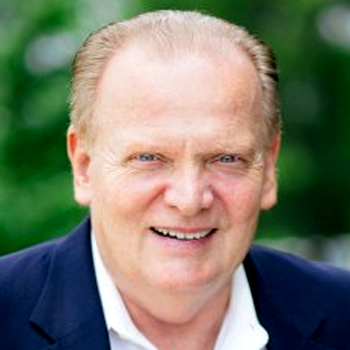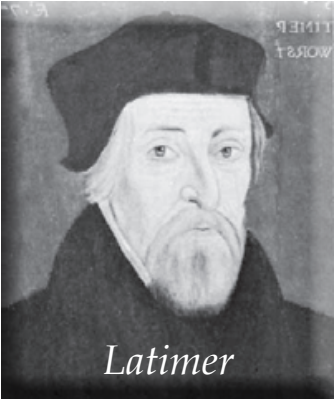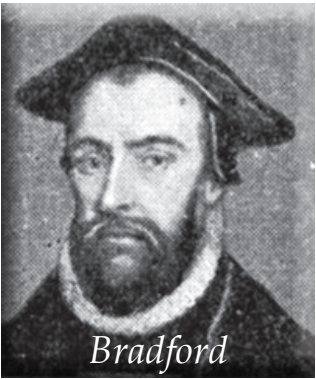Back to series
Hugh Latimer (1485-1555)



Hugh Latimer (1485-1555)
John Bradford (1520-1556)
Click here to open a Print - Friendly PDF
Martyrs of the English Reformation
HUGH LATIMER is known as the greatest preacher of the English Reformation. He was often asked to speak before King Henry VIII and King Edward VI. He was a man who showed great courage and faith.
Prior to his conversion, Latimer was a leader of the opposition to Reformation doctrines at Cambridge University. He later wrote of that period of his life:
I was an obstinate a papist as any was in England, insomuch that when I should be made bachelor of divinity, my whole oration went against Philip Melanchthon and his opinions.
He often debated with other students who held to Reformation principles. When Stafford lectured on the Bible at Cambridge, Latimer was present, trying to frighten and drive away students. He was even elected to the office of cross bearer—leading the religious processions of the university.
Thomas Bilney, one of the first students at Cambridge to embrace the principles of the Reformation, saw Latimer’s stubbornness, and desired to speak to him. He knew that it would be impossible to approach him directly. So Bilney asked Latimer to hear his confession. As Bilney spoke, Latimer’s heart was moved. Latimer said afterwards:
I learnt more by this confession than in many years before. From that time forward I began to smell the word of God, and forsook the doctors of the schools…
Latimer began an intense study of the Scriptures. He often took long walks with Bilney, and they visited prisoners and those who were sick. Latimer began preaching in the university pulpits, having a great impact on many who heard him. Becon, later Cranmer’s chaplain, said of Latimer’s preaching:
None except the stiff-necked and uncircumcised in heart went away from it without being affected with high detestation of sin, and moved unto all godliness and virtue.
Preaching was important to Latimer because it was the means of salvation. Latimer said, “Take away preaching and take away salvation.” He was also strongly opposed to those ministers of his time who preached infrequently, if at all. He said:
It is declared in many places in Scripture how necessary preaching is…. This is the thing that the devil wrestleth most against: it hath been all his study to decay this office. He worketh against it as much as he can: he hath prevailed too much, too much in it. He hath set up a state of unpreaching prelacy in this realm this seven hundred years.
In a later sermon before King Edward VI, Latimer pleaded with the king to rule so that “preaching may not decay: for if preaching decay, ignorance and brutishness will enter again.”
Latimer was made chaplain to King Henry VIII. He struggled to be faithful and uncompromising in his proclamation before the King. Latimer was impressed by a couple of statements from the church fathers. Augustine had said:
 He who for fear of any power hides the truth, provokes the wrath of God to come upon him, for he fears men more than God. Similarly, Chrysostom had maintained:
He who for fear of any power hides the truth, provokes the wrath of God to come upon him, for he fears men more than God. Similarly, Chrysostom had maintained:
He is not only a traitor to the truth who openly for truth teaches a lie; but he also who does not pronounce and show the truth that he knoweth.
Latimer resolved to declare God’s truth even if it cost him his life. He was direct in confronting the king. King Henry kept a large number of horses in abbeys originally founded for the support of the poor. Once in a sermon Latimer said to the king:
A prince ought not to prefer his horses above poor men. Abbeys were ordained for the comfort of the poor, and not for the king’s horses to be kept in them.
There was silence in the congregation. Many were angry at Latimer’s boldness. Later at a large reception, a monk came up to the king and said, “Sire, your new chaplain preaches sedition.” Henry turned to Latimer, “What do you say to that, sir?” Latimer said to his accuser, “Would you have me preach nothing concerning a king in a king’s sermon…” Then he turned to the king and said:
Your Grace, I put myself in your hands: appoint other doctors to preach in my place before your majesty. There are many more worthy of the room than I am. If it be your Grace’s pleasure, I could be content to be their servant and bear their books after them. But if your Grace allow me for a preacher, I would desire you give me leave to discharge my conscience. Permit me to frame my teaching for my audience.
Henry liked Latimer and remained on his side. When Latimer left the reception, his friends came up to him with tears in their eyes saying, “We were convinced you would sleep tonight in the tower.” Latimer replied, “The king’s heart is in the hand of the Lord” (Prov. 21:1).
When Queen Mary came into power, Latimer was one of the first church leaders imprisoned in the tower. For two years he remained a prisoner. During that time, he read the New Testament through seven times. Finally, at Oxford, on October 16, 1555, Latimer was burned alive along with Bishop Ridley (perhaps the ablest scholar of that time). They were chained to the stake. When the fire was lit, Latimer said to Ridley, “Be of good comfort, Brother Ridley, and play the man; we shall this day light a candle by God’s grace, in England as I trust shall never be put out.”
In the way Latimer lived, preached, and died, he is a model of what a difference Christ’s grace and power can make in a life.
John Bradford
 John Bradford was another English reformer who came to faith under the preaching of Hugh Latimer. Bradford was known as the most holy and devout of the martyrs who died during the reign of Queen Mary in England. Bradford’s significance lies in the effect he had on the later Puritan movement. He provided a model of a godly minister. His writings express the main doctrine that they loved, and his piety inspired their devotion.
John Bradford was another English reformer who came to faith under the preaching of Hugh Latimer. Bradford was known as the most holy and devout of the martyrs who died during the reign of Queen Mary in England. Bradford’s significance lies in the effect he had on the later Puritan movement. He provided a model of a godly minister. His writings express the main doctrine that they loved, and his piety inspired their devotion.
After Bradford’s conversion under Latimer’s preaching, Bradford attended Cambridge to prepare for the ministry. When he finished at Cambridge, he was asked by Bishop Ridley to become one of three itinerant preachers traveling and proclaiming the gospel. Bradford was known as a preacher of the Word. His preaching was warm—heart to heart. He was a preacher of righteousness and repentance. His sermons have the ring of passionate earnestness.
Bradford was also noted for his piety. Thomas Sampson records that Bradford daily used a journal. The purpose of this diary was to encourage repentance. He felt that it was important not only to repent when initially becoming a Christian but also to continually repent. Bradford used this diary along with his daily prayers. Scholars believe that Bradford provided the model which was followed in many subsequent Puritan diaries. His most famous sermon was his “Sermon on Repentance.” It went through ten editions from 1553 to 1652.
Bradford had much to say about the conscience. The goal of the disciplined life was a good conscience. He says: “A good conscience—I call a good purpose in all things to live after God’s will.” He often stressed the importance of understanding justification by faith alone and applying this truth to our conscience. Bradford maintained that we are justified not by our own efforts, but:
…by faith, which only (that is alone) in quieting the conscience looketh clean out of ourselves into the mercy and grace of God in Christ.
In a letter to a Mrs. Honywood, he speaks of the importance of assurance and quieting the troubled conscience:
If Satan attacked your conscience, or God’s law to accuse you, confess your fault, and hide it not before the lord: but when they would infer that because of your sin you are condemned, you are cast away, then answer them, that is but their office to accuse and witness, not to give sentence and judge: it only appertaineth to God to give judgment. Paul saith, “It is God that absolveth, who then shall condemn.”
In his treatise on the Old Man and the New, Bradford speaks of the conscience in a graphic manner as the wife of Christ:
As a wife will keep her bed only for her husband although in other things she is contented to have fellowship with her servants and others, as to speak, sit, eat, drink, go, etc.: so our consciences which are Christ’s wives, must need keep the bed, that is God’s sweet promises, alonely for ourselves and for our “Husband”there to meet together, to embrace together, to laugh together, and to be joyful together. If sin, the law, the devil, or anything would creep into the bed, and lie there, then complain to thy “Husband” Christ…
Bradford was a good friend. He became especially close to Martin Bucer, one of the leaders of the Continental Reformation. The two became close friends when Bucer came to teach at Cambridge. When Bucer became ill, Bradford often visited him. In Bucer’s final days he could hardly breathe. During a visit Bradford reminded Bucer of the promises of Christ—to remember who He was, what He had taught, what steadfastness He had always shown. He exhorted Bucer to cast his whole mind, care, and thought upon Christ. Only He could restore from darkness to light, from despair to hope, from death to life. Bucer replied that he did not wish to have his mind drawn away from the meditation in which he was engaged, even by Bradford’s well-intentioned exhortation. Bucer said that his eyes were fixed upon Christ crucified, that God dwelt in his heart, and that he was contemplating nothing but heaven and a speedy departure from this body. This story illustrates both Bradford’s great desire to encourage his friend and Bucer’s intense focus on Christ.
Soon after Mary became queen, Bradford was put in the tower. He remained there for over a year. On the afternoon of June 30, 1555, Bradford received word that he would be burned the next day. When he heard the news, he put off his hat and prayed:
Lord, I thank thee, I have looked for this a great while, it is not terrible to me. God make me worthy of such a mercy.
When Bradford was brought to Smithfield the next morning, a huge crowd was assembled. To be burned with Bradford was John Leaf, a young apprentice. At the stake, Bradford and Leaf prostrated themselves in prayer. One of the sheriffs interrupted them because the crowd was pressing closer and closer. Bradford arose and called on England to repent. Then he turned to Leaf and said, “Be of good comfort brother; for we shall have a merry supper with the Lord this night.” As they were consumed in flames, Bradford’s last words were, “Straight is the way, and narrow is the gate, that leadeth to salvation, and few there be that find it.”
Bradford was truly a profile of faith in the way he lived and the way he died.

Arthur W. Lindsley
Senior Fellow for Apologetics, CSLI Arthur W. Lindsley is the Vice President of Theological Initiatives at the Institute for Faith, Works, & Economics. He has served at the C.S. Lewis Institute since 1987 both as President until 1998 and currently as Senior Fellows for Apologetics. Formerly, he was director of Educational Ministries at the Ligonier Valley Study Center, and Staff Specialist with the Coalition for Christian Outreach. He is the author of C.S. Lewis's Case for Christ, True Truth, Love: The Ultimate Apologetic, and co-author with R.C. Sproul and John Gerstner of Classical Apologetics, and has written numerous articles on theology, apologetics, C.S. Lewis, and the lives and works of many other authors and teachers. Art earned his M.Div. from Pittsburgh Theological Seminary and a Ph.D. in Religious Studies from the University of Pittsburgh. COPYRIGHT: This publication is published by C.S. Lewis Institute; 8001 Braddock Road, Suite 301; Springfield, VA 22151. Portions of the publication may be reproduced for noncommercial, local church or ministry use without prior permission. Electronic copies of the PDF files may be duplicated and transmitted via e-mail for personal and church use. Articles may not be modified without prior written permission of the Institute. For questions, contact the Institute: 703.914.5602 or email us.
COPYRIGHT: This publication is published by C.S. Lewis Institute; 8001 Braddock Road, Suite 301; Springfield, VA 22151. Portions of the publication may be reproduced for noncommercial, local church or ministry use without prior permission. Electronic copies of the PDF files may be duplicated and transmitted via e-mail for personal and church use. Articles may not be modified without prior written permission of the Institute. For questions, contact the Institute: 703.914.5602 or email us.
-
Recent Podcasts
Fix Your Eyes Upon Jesus
by Steven Garber, Aimee Riegert on June 27, 2025Perhaps the most prominent and current figure who...Read More
-
An Honest Search for God – Dr. Jay Medenwaldt’s Story
by Jana Harmon, Jay Medenwaldt on June 20, 2025
-
Moving Beyond Forgiveness to an Abundant Life
by Robert Saucy, Aimee Riegert on June 13, 2025
-
Recent Publications
Are Miracles Possible
by Christopher L. Reese on June 1, 2025The 21st century has provoked many conversations and...Read More
-
Is God Just, Not Fair?
by Jennifer Rothschild on May 15, 2025
-
Seeking Dietrich Bonhoeffer
by Joseph A. Kohm on April 29, 2025
0
All Booked
0.00
All Booked
0.00
All Booked
24720
The Adventure of Joining God in His Work Live Online Small Group 7:00 PM CT
https://www.cslewisinstitute.org/?event=the-adventure-of-joining-god-in-his-work-live-online-small-group-700-pm-ct&event_date=2025-09-16®=1
https://www.paypal.com/cgi-bin/webscr
2025-09-16

Next coming event
Days
Hours
Minutes
Seconds
The Adventure of Joining God in His Work Live Online Small Group 7:00 PM CT
On September 16, 2025 at 7:00 pmSpeakers

Arthur W. Lindsley
Senior Fellow for Apologetics, CSLI
Team Members





